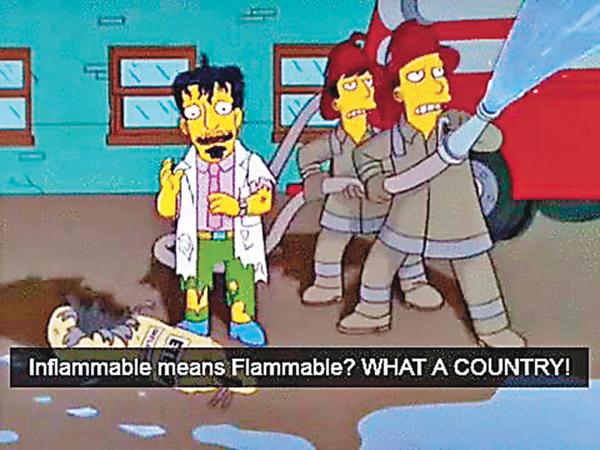 ■「Inflammable(可燃)等於flammable(易燃)?」不熟悉英文字首,隨時如上圖主角般惹火上身。 網上圖片
■「Inflammable(可燃)等於flammable(易燃)?」不熟悉英文字首,隨時如上圖主角般惹火上身。 網上圖片In-是一個常見的英文字首(prefix),有「相反」、「沒有」、「不是」的意思,可以加在一些形容詞或副詞前面,組成反義詞。
例如,direct的意義是「直接」,加上in-,組成indirect,就變成「不直接」或「間接」;consistent(一致、一貫)前面加上in-,就變成 inconsistent,即是「不連貫」或「不一致」;insufficient意思是「不足夠」,是sufficient「足夠」的反義詞。
然而,這情況並非沒有例外。Flammable和inflammable就是很有趣的一對,經常引起混淆。因為,他們是同義詞。
Flammable義同Inflammable
Flammable源自flame(火),是形容某些東西「易燃」、「可燃燒」。反義詞並不是inflammable,而是non-flammable,non-同樣有否定原來意義的作用。
Be careful. The liquid is flammable. It can burn easily.
小心。此為易燃液體,可容易燃燒。
The furniture is made of non-flammable materials.
此傢具以不易燃物料製造。
In-時非「相反」 指「更加」
有趣的是,加上in-後組成的inflammable,意義卻與flammable一樣,指「可燃性高」,只是inflammable開首的in-容易引起混淆,令人誤會他們意思相反。
Inflammable的字首in-與上文所說帶有相反意思的in-不同。這個in-源自拉丁文,有「招來」、「更加」的含意。
Inflammable substances should not be placed near the kitchen.
易燃性物質不應放近廚房。
易引誤會避用 引申「火爆」
由於容易引起混亂,很多時都避免使用inflammable,特別在提醒別人小心易燃物品,或發出警告字眼的時候,用flammable會清晰一點。
後來,inflammable的意思進一步引申,用於比喻某些情況令人非常憤怒,可以引致火爆場面。
He is often criticized for his inflammable language.
他常常因為惹火言論而遭到批評。
If not handled carefully, the issue can turn inflammable.
如果不小心處理,這個問題會引起眾怒。
The government's decision enraged the people and caused an inflammable situation.
政府的決定觸怒了人民,導致激烈局面。
故此,不要誤會了flammable和inflammable是反義詞,它們其實是同義詞,都解作易燃,而inflammable更有另一層引申意思。■Lina CHU [ linachu88@gmail.com ]
隔星期三見報

